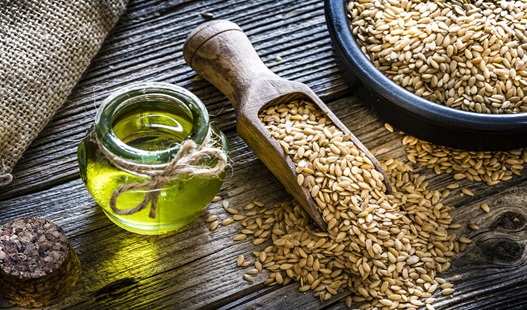If you are trying to find the right mix of ingredients to use in your food in order to cut that bloating, you must look at products that are causing inflammation in your body. Start by relooking at the oil you use! Research shows that seed oils are much better than vegetable oils when it comes to regulating inflammation in the body, and thus, promote gut health.
Interestingly, not only is flax seed oil great for the gut, but it also has the ability to reduce cancer cells. This study, published in the official journal of Balkan Union of Oncology, stated at flax seed oil prevented the spread of the tumour. Another study, published in European Journal of Clinical nutrition, stated that flax seed oil controlled blood pressure. The list of seed oil advantages are endless! Thus, you must include seed oils for a healthy gut in your diets.
What are seed oils?
Seed oils are derived from plant sources, especially seeds like sunflower, sesame, flax, and pumpkin. Seed oils play a crucial role in cookery, contributing exceptional flavour to a variety of dishes. Garima Goyal, dietitian explains that this oil might even prove to be better than vegetable oil in some aspects. “Vegetable oils are generally advised to be used in moderation due to their omega-6 fatty acid content which could potentially trigger inflammation,” she says.
Seed oils, on the other hand, contain omega-3 fatty acids which can be beneficial in modulating inflammation. “There are various seed oils, and they all have varying qualities. Also are different cooking techniques, culinary preferences, and health concerns, and they all have their own benefits. There is no one-size-fits-all, taking the overall diet’s fatty acid balance into account is crucial. You can achieve a balanced intake of important fats by using a range of cooking oils,” she adds. We all know that hemp seed oil has some amazing Ayurvedic properties for health and skin.
6 best seed oils you must use for a healthy gut
Check out the best seed oils for healthy gut! “Before using oils in cooking, it is important to know about their stability. Typically for an Indian cooking for a long time heating some oils might not be ideal,” warns Goyal.

1. Flaxseed oil
Flaxseed oil is known for its omega-3 fatty acids can be used in salad dressings and drizzled over finished dishes. It is a versatile oil. Flaxseed oil has health benefits that range from weight management and fertility to hair health.
2. Pumpkin seed oil
Pumpkin seed oil imparts a rich, earthy taste to salads and soups. It can help in enhancing the overall taste of the dish.
3. Sesame seed oil
Sesame seed oil has a high smoking point. Sesamol and sesaminol, two heart-healthy antioxidants, are abundant in them and may offer a number of advantages.
4. Safflower plant’s seed oil
These seeds are used to make safflower oil. Its proportion of unsaturated fatty acids is higher and its saturated fat content is lower.
5. Sunflower Seed Oil
Sunflower seed oil is a good option for supporting gut health because it is low in saturated fat and high in vitamin E.
6. Black seed oil
Black seed oil can be used in low-heat or no-heat recipes. They help ease inflammation and promote gut health.
Can seed oil be made at home?
If it’s so good, why not make this golden liquid at home? If you are looking for a recipe of seed oil, you might have to halt your research as it might not be as easy to make seed oils at home, as you think. “Preparation of seed oils, though possible could really be a long and laborious work that might not be possible for everyone. Commercially prepared seed oils are highly processed and undergo heat treatment. With the help of a few specialized equipment, seed oil can be extracted at home from specific seeds like chia, flax, sunflower, sesame, and pumpkin using a cold-pressing technique,” explains Goyal.
It’s me Ainnie Allen, the talented individual behind this captivating blog, is a remarkable young talent at just 25 years old. With an impressive five years of experience in the dynamic world of blogging, I have honed my skills to perfection. My passion for writing and dedication to my craft are evident in every word I pens. Through my blog, I have share my unique insights, knowledge, and experiences with a keen audience, leaving an indelible mark in the blogging community.










